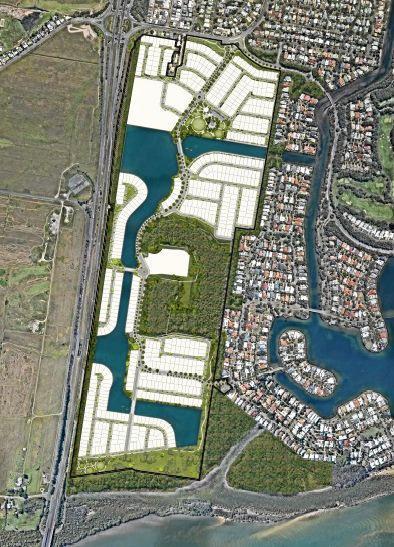Council and the community have notched a huge legal win against Stockland and its 13-year fight to build a new master-planned community on a floodplain.
Judge William Everson on Thursday dismisssed Stockland’s proposal for a housing estate with a pumped saltwater lake at Twin Waters West.
The judge warned that allowing the development in its current form risked the “real prospect of detriment and destruction” of a nearby wetland.
The estate’s scale was also not consistent with the “low density” character of the adjoining Twin Waters community, stated Judge Everson.
The key issues in contention focused on the ecological impact of Twin Waters West which is located near the Maroochy River.
The site borders the Sunshine Motorway to the west and the existing Twin Waters community to the east and has a large freshwater “central wetland” protruding into the site.
The 170-lot development was knocked back by council in July 2020 and Stockland lodged an appeal which triggered a lengthy four-week hearing in the Planning and Environment Court which wrapped up in August.
Judge Everson handed down his decision earlier than expected, dimissing Stockland’s appeal.
The judge concluded that the central wetland in question was of “high ecological significance” and was meant to be protected under the council’s planning scheme.
He said Stockland had not proven that its proposed development would protect and enhance the health of the wetland where some 160 native animals were known to be.
“Indeed, on the evidence before me, there is a real prospect of detriment or destruction of this wetland should the appeal be allowed,” the judge noted in his decision.
“The failure of the appellant to discharge the onus of demonstrating that the areas of high ecological significance on the site, including the central wetland, will be protected and enhanced is such that the appeal should be dismissed on this basis alone.”

The judge was not happy with the arguments put forward on behalf of Stockland that it would mitigate the impact of its development on the environment.
In particular, Judge Everson warned that the “biggest threat to the central wetland” would be a large saltwater lake proposed as part of the estate.
This lake could leach salt water into the freshwater wetland, the judge said.
Furthermore the judge was not convinced that there was enough of a buffer to environmentally significant areas including the central wetland and linkages for fauna.
The buffer was as little as 6m in parts such as near the saltwater lake, the judge noted.
“The buffers proposed by the appellant simply do not comply with what is contemplated by the planning scheme,” his decision stated.
Judge Everson was also not impressed with some of Stockland’s ecological experts and dismissed certain claims about protecting the wetland.
For example, Judge Everson described Stockland’s proposal to recharge the central wetland with collected rainwater and protect it from leaching salinity as a “hypothetical engineering solution” that was “most unconvincing”.
“Not only does the proposed development fail to comply…but it completely ignores the requirement running through the planning scheme to both protect and enhance the central wetland, including adjacent fauna linkages and habitat,” he said.
“In this regard, there was an absence of any serious attempt on the part of the witnesses called by the appellant to demonstrate how the proposed buffers would also enhance the health of the central wetland from an ecological perspective.”
A Stockland spokesperson said the company was disappointed that its proposal for a “low density, premium lakeside residential community has not been approved”.
“Developable landholdings, like Twin Waters West, are increasingly scarce, and can play a significant role in addressing housing supply as well as driving job creation and regional investment in infrastructure.
“Stockland will review the judgment and consider next steps.”
The council’s position was supported in court by a number of groups as co-respondants including Twin Waters West and Surrounds, Sunshine Coast Environment Council (SCEC), Development Watch, Organisation of Sunshine Coast Association of Residents (OSCAR) and community groups.
Sunshine Coast Environment Council (SCEC) advocacy officer Narelle McCarthy said the judge’s flat refusal of Twin Waters West was “very telling”.
“It was really clear…and good news for the community. It’s up to Stockland what they do next.”
Ms McCarthy said SCEC, which supported council’s defence, would like to see the land rezoned so it could be protected as an environmental space into the future for “passive recreation”.
“Ultimately we would like to see no development because it’s part of the floodplain and rezone the area and expand the conservation park,” she said.
“Stockland might choose to donate it to council as a reserve.”
A council spokesperson said Stockland’s application had been thoroughly assessed on its individual merits.





